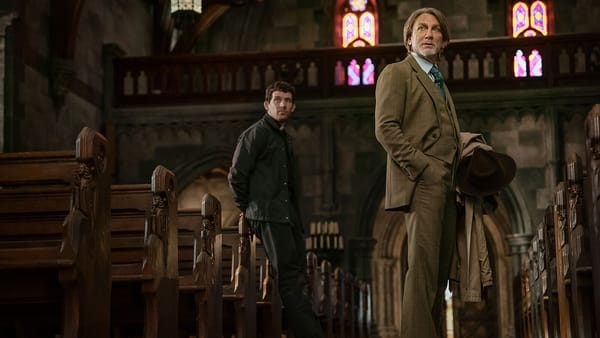Book of the Month: THE MINISTRY OF UNGENTLEMANLY WARFARE by Damien Lewis
In the world's darkest hour, they raised bloody mayhem—and wrote themselves into history.

After spending last month burying myself in poetry, I decided that in the month of May, I would head back to a familiar literary stomping ground of mine: historical nonfiction. Therefore I have chosen to highlight a book about one of the most important and dramatic periods in modern history and a series of perilous undertakings which would not only alter the course of military history but impact the pop culture of the 20th and 21st centuries.
When you hear the word "spy," what images does your brain conjure up? Most likely you imagine the classic archetype of the espionage hero: a man of action who's both charming and ruthless, who travels the world embarking on secret missions to ruin the diabolical plan of some powerful villain, missions which always involve fistfights and chase scenes and giant explosions. This archetype remains alive and well in the Western imagination today, as we can see if we just look around us—as I write this, for example, the eighth Mission: Impossible film has just been released in theaters. But who or what introduced that archetype into our culture in the first place?
Readers familiar with the history of espionage fiction will likely point to the James Bond series and its creator Ian Fleming, but that only answers part of the question. What people and events did Fleming himself draw inspiration from? Well, Fleming served with the Naval Intelligence Division during the Second World War, and his later fiction career was in part inspired by his own exploits and those of his peers. And among those peers were the chaotic, larger-than-life members of the Special Operations Executive (SOE), the subject of this month's book.
Damien Lewis, a British author/documentary producer/former war correspondent, has been writing nonfiction about modern military history since the early 2000s. Published in 2014, The Ministry of Ungentlemanly Warfare tells the stories of various SOE operatives and their secret missions to destabilize the Axis war effort by raiding enemy strongholds. Such missions were some of the first deniable secret military operations in modern history, setting the stage for subsequent covert operations and guerrilla warfare in the late 20th and 21st centuries.
The book's original title was Churchill's Secret Warriors; later editions had their title changed to The Ministry of Ungentlemanly Warfare to tie into the 2024 film adaptation of the same name, a pulpy action flick that loosely dramatizes the first section of Lewis's narrative. And yet the changed title fits the book just as well, if not more so—it cuts right to the heart of the SOE's overall mission and the desperate times in which they fought. We begin by learning how Winston Churchill's government founded the organization in July 1940, only weeks after the evacuation of Dunkirk and the start of the Battle of Britain. Foes as terrible as Hitler and Mussolini needed to be met with ruthless, destructive opposition if the Allies were to survive: in Churchill's own words, it meant that the SOE's mission was to "set Europe ablaze."
From there, the book follows the evolution of the SOE throughout the war, from its early days conducting raids on German outposts in the English Channel to its collaboration with the SAS on attacking Greek islands in preparation for D-Day. The narration moves at a brisk and lively pace when covering the general history of the organization and the daily lives of its members; training agents, planning missions, the occasional humorous anecdote, etc. But the real highlights of the book are the raiding missions themselves. Here Lewis slows down the clock and gives readers a gripping, blow-by-blow account of the SOE members' activities in the field. You follow them as they painstakingly cut through wire fences, sneak aboard boats, set off explosives, knife their enemies in the dead of night and raise hell just about everywhere they go.
The most exciting section of the book is probably the chapters covering Operation Postmaster, the earliest and most famous raid conducted by SOE forces. Its mission? Steal two German ships and an 8500-ton Italian merchant liner from a Spanish-controlled port in West Africa, right out from under the Axis captains' noses. Its weapons? Two tugboats, a 65-ton fishing vessel and lots of bombs. Its execution? Thanks to Lewis's vivid descriptions, memorable and highly explosive:
There was a violent flash and the first explosion tore across Santa Isabel Harbour, ripping the peace of the night apart...
Indeed, the entire expanse of the U-shaped harbour was little more than 3,000 yards across. That first explosion flashed across the compact confines of the bay, the punching roar of the blast thundering across the Italian vessel's decks, rebounding off the sheer volcanic rock walls and echoing back and forth across the water.
(pages 77-78)
The story of the SOE is told through the eyes of its field agents, the men who conducted those perilous missions. Their numbers are many, and they weave in and out of the narrative. But the one who emerges as a clear protagonist—mainly because he survives the longest—is Anders Lassen, a Dane who was barely in his twenties when he joined up with the SOE. Drawing from diary entries and secondhand accounts, Lewis paints Lassen as a larger-than-life figure: fearless, unpredictable, determined, the kind of man who could hunt his enemies with a bow and arrow or trick German soldiers into following his orders while in the midst of battle. Yet the ultimate tragedy of his situation is also emphasized. Readers witness Lassen's gradual acclimation to brutal violence, his addiction to amphetamine, the dehumanizing conditions in which he and his peers trained and fought. And, of course, his untimely death in action at age 24.
In contrast to his Anderson Manor bravado with the bloodstained blade, it was in his diary that Lassen confided most candidly his feelings upon first knifing to death a fellow human being. 'The hardest and most difficult job I have ever done - used my knife for the first time.'
Lassen had always intended that his diary go to his mother if he were killed in action. He'd clearly found that silent killing at close quarters troubling: the reference to using his knife is the last diary entry; the remaining pages are left blank.
(page 153)
These darker aspects of the narrative are what give the book its bitter edge and keep it grounded in the reality of World War 2. While the raiders' actions were depicted as glorious by the British press—and they did pull off some remarkable feats of warfare and subterfuge—their victories were hard won and often came at the cost of their own lives, or the lives of civilians who assisted them.
Lewis also details the sharp criticisms leveled at the SOE by other arms of the British military, particularly where Operation Postmaster was concerned. The objections of the Army and the Foreign Office were fueled by a genuine, understandable fear that the raiders' actions would lead to disaster for the war effort. It was essentially an act of piracy, carried out in a port belonging to a neutral territory—had the Axis been able to produce proof that Britain carried out the operation, Spain might have been convinced to join them in the war. Later military operations in the book take on a more conventional style, but the risky and somewhat dubious nature of Postmaster makes that early section of the book especially compelling.
While Lewis does note that the central figures of his tale had their critics among the Allies, he doesn't dwell much on the critiques themselves or give their words much weight. He consistently presents the "butcher-and-bolt raids" as a necessary and appropriate response to Nazi brutality, if not the only way that the war could have been won. And that might have been true, but I thought the analysis of the SOE's impact could have gone deeper than that.
That analysis is also somewhat hampered by the fact that it doesn't really extend past the end of the war. Despite the subtitle of the book boasting that this is a story about "the mavericks who plotted Hitler's downfall, giving birth to modern black ops," Lewis is not interested in examining how the SOE's strategies have had an impact on modern military operations. The main narrative comes to an abrupt stop with the death of Anders Lassen in 1945; after that comes a brief epilogue explaining how the organization was officially disbanded after the war but was unofficially kept around for the purpose of hunting down Nazi fugitives. Lewis ends the book by saying that the original key leaders of the SOE raiding parties would have approved of such missions had they lived to see them.
And that's all you really get. There is no discussion of how the SOE influenced future covert operations by the likes of the CIA, MI6, Mossad, etc. There's definitely no discussion of how the SOE's model of warfare has been emulated by many terrorist groups as well as world governments. It feels as though there are blank holes in the narrative where that complicated legacy should be. I suppose you could make the argument that the book is less about the organization itself and more about the personal stories of some of the men who served in it. But even then, a lack of reflection on how the things these men did and the choices they made reverberated through the decades after their deaths gives the impression that this is a story missing its final chapter.
The Ministry of Ungentlemanly Warfare is a fast-paced narrative that brings some of World War 2's most audacious secret battles to life in exciting detail, along with the colorful characters who spearheaded those missions. Lovers of action and adventure will delight in how Damien Lewis recounts the SOE's most famous heists and raids, with the highlight being the chapters focused on Operation Postmaster; the book's quality doesn't necessarily drop after that section, but nothing which follows it is quite as compelling. Some readers may be disappointed by the book's shallow analysis of the SOE's impact on postwar military history, particularly its connection to the rise of modern-day covert operations. But your appetite will be sated if you're looking to read an exciting war story with protagonists who could have stepped out of a spy thriller—because their lives became the very stuff of those legends we're still creating today.
I hope you've enjoyed reading about my Book of the Month pick for May. Check back in June for my next selection!
—Dana




